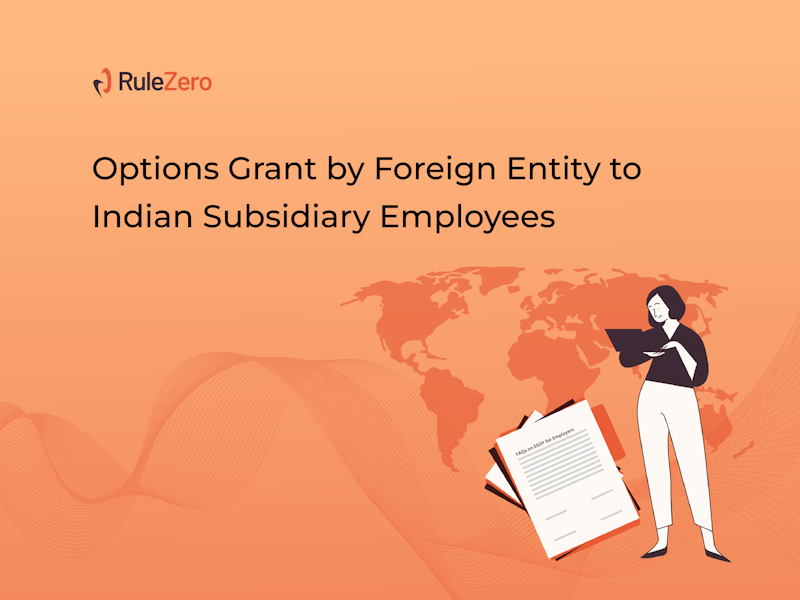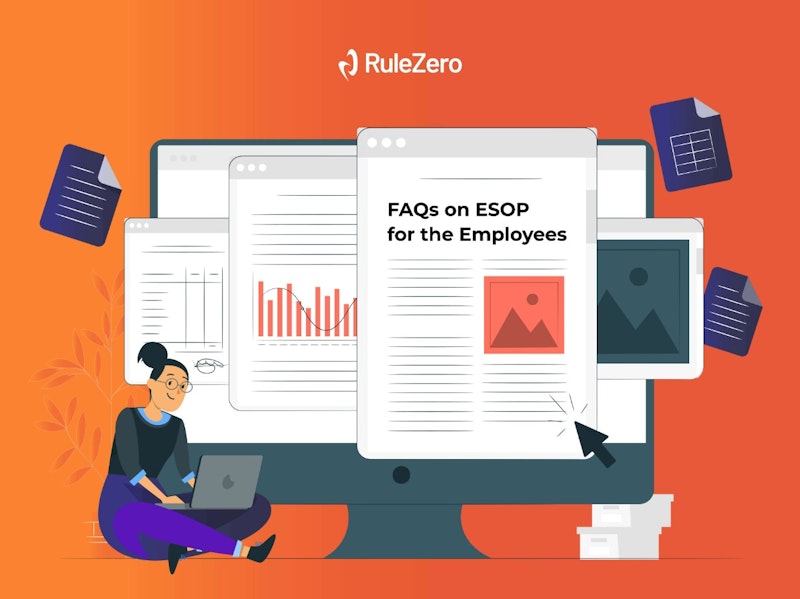Companies no longer have only a domestic presence. Over a period of time many companies look to move the ownership outside India for many reasons. A common factor being attracting investors and leveraging on the light-touch regulatory landscape to provide easier exits. On the other hand, many foreign companies are setting up subsidiaries in India. This is to attract resources and domestic talent, as well as expand their reach in the local market.
If one company holds more than 50% of stock in another company, the former is the parent (or holding) company and the latter is its subsidiary.
Value consolidation often happens at the parent company level, and when the holding company is located outside India, stock options can be granted from the holding company to employees of its subsidiaries in India. These are commonly called foreign stock options, which are granted under an approved global stock option plan.
Grant of foreign options are cross-border transactions. This results in the outflow of foreign reserves. Hence transactions of this nature are regulated by Indian authorities. While employees have a basic understanding of how stock options work at the domestic level, foreign options are a lesser treaded territory.
To help employees of subsidiaries in India who have received options from their foreign holding company, we have put together a few important points in this blog.
1. What are the key points to note in a grant letter received from a company’s foreign parent?
The first point to note, as with all options, is the terms of the grant. There must be clarity on the number of options being granted, as well as how they vest and can be exercised. As always, vesting may be time-based, performance-based, or both. Employees must also check how payment can be made to exercise vested options. Many foreign companies opt for cashless exercise to avoid the hassle of foreign exchange.
2. Do options issued by a foreign entity work very differently from how they operate in India?
Options work based on the laws of the country. In jurisdictions such as Singapore and the United States, ESOPs are more or less administered the way they are in India. The principle of common laws would require companies to have a stock option plan and a stock option pool. The grant must be made under a stock option plan. Employees will need to satisfy the vesting conditions mentioned in the grant letter to become eligible to exercise options and purchase the company’s shares.
3. How is the exercise price paid?
Exercise price is the nominal amount payable by employees to purchase the shares of the company. This amount is mentioned in the grant letter given to employees.
RBI regulations must be followed when paying the exercise price. RBI’s overseas direct investment (ODI) regulations specify how employees of an Indian subsidiary of a foreign company can buy shares of the foreign parent. Payment for purchase of shares upon exercise of options happens under a Liberalised Remittance Scheme (LRS), subject to an annual limit for individuals, which is USD 2,50,000.
If the employee wants to remit the exercise price amount, then they must execute an ODI form. Once this is done, the RBI generates a unique identification number (UIN). All payments made to the holding company will be made against this UIN and through an authorised dealer (AD).
Companies can also go for cashless exercise. Under cashless exercise, the employee need not pay the exercise price to purchase the foreign company’s shares. Hence there will not be any outflow of foreign exchange under such a grant. Hence it is easier to administer, and no prior permission needs to be taken for making any payment.
4. Who monitors and administers the stock options? The Indian subsidiary or its foreign parent?
The type of stock option under which the grant has been made determines who administers the plan. A few plans allow their subsidiaries to administer the plan. This allows the subsidiary to have direct control over employees who work for the company.
5. When the options are exercised, does the employee get the shares in the parent company or the subsidiary company?
Upon exercise, employees receive the shares of the foreign holding entity. Once the employee becomes a shareholder, their rights will be governed by the foreign company’s articles/constitution/ bylaws.
6. Soon after exercising options, what will be the rights of the employee as the shareholder of the foreign holding entity?
As a shareholder, the employee will enjoy all rights that the laws of the country in which the holding company is incorporated provides to its shareholders.
7. What are the disclosure requirements of income earned from foreign options by an Indian employee?
The employee must disclose the foreign income under the ‘foreign asset’ schedule in his/her income tax return.
8. What happens to the options if the subsidiary employee resigns from work or the employment is terminated?
While stock option plans will mention in detail how the options will be treated when an employee separates from the company, there are some market standard practices that can be observed:
- Resignation/Termination without cause– If the employee resigns, the vested options can be exercised. However, the exercise request must be sent within the timeframe (exercise period) set out in the plan, failing which the options lapse. Unvested options are cancelled and added back to the pool.
- Termination– Separation on account of cause events like theft or fraud, where the company terminates employment, will result in all vested and unvested options lapsing. This means no options can be exercised. Both vested and unvested stock options are added back to the option pool of the foreign holding entity.
9. Can shares be transferred post exercise of options?
Shares can be transferred from one resident shareholder to another, as well as from residents to non-residents (from an India regulatory perspective). However, the foreign entity must be notified, and local compliance and regulations in the jurisdiction where the foreign company is incorporated must be complied with.
10. In what jurisdiction is the tax payable?
Typically, income earned from abroad is taxed in both the country in which the income arises and the country in which the taxpayer resides. Taxability of options in India is generally dependent on where the income is earned. For example, if the options were allotted for services rendered in India, the income on exercise may be taxed in India. If India has a DTAA with the country, then the employee will only pay tax in the resident country (India).
11. Should the employee (shareholder post exercise of options) file any report to the RBI on the foreign shares held?
No. As a shareholder, the employee need not notify the RBI of any foreign shareholding. The Indian subsidiary has to make the required disclosures. The Indian subsidiary has to file an annual report through its Authorised Dealer reporting the status of the percentage of foreign holding on the Indian subsidiary cap table and subsequent changes, if any.
Any change in the holding company’s structure or stock price affects all employees globally. The holding company’s management sets the terms of the grant.
Indian laws require the foreign holding entity to make grants to its subsidiaries across the globe on a uniform basis.
This means the terms of the grant must be the same to all employees who have been granted stock options globally (across all its subsidiaries). The effect will be the same, irrespective of the subsidiary’s location.
Since the administration and compliance procedures with holding foreign options are different, employees must evaluate and understand the concept well before accepting the offer.










